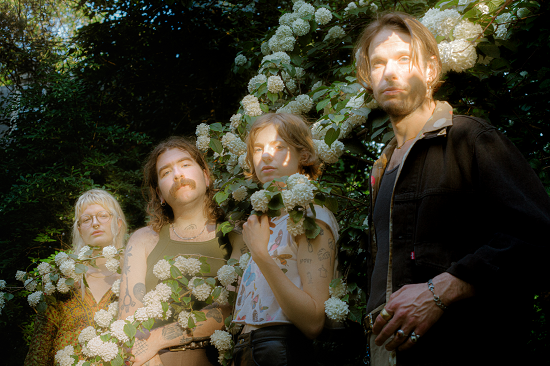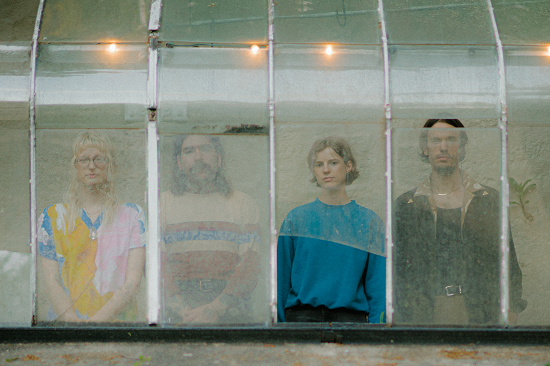All photos by Marie Lin
When Catherine Elicson from the band Empath listens to Psychocandy, she’s taken straight to her adolescence in the Midwest. “I’m brought back to my mini-van, driving in the backwoods to my friends house in high school, or biking while the sun is setting.” Loveless will conjure a bus ride to school, her head knocking against the window with every bump in the road. When a friend of the band hears Alice Coltrane’s Journey In Satchidananda, he gets such intense flashbacks that he has to turn the music off immediately.
Perhaps there are certain types of music that can transport you more than others. Is there something inherent to the atmosphere of Kevin Shields’ or the Reid brothers’ barrages of noise, or to Coltrane’s transcendent jazz, or were those records just the incidental soundtrack to formative moments? If, in fact, there is a certain kind of music that can do something special to the memory, Empath are the kind of band who make it. Their new album Visitor is a delightful clutter, a riveting patchwork of anarchic rhythm, whacked-out psychedelic pop, found sound and long-form experimental improv, that make for something deeply evocative.
What exactly it’s evocative of is entirely up to you. At their best, Elicson’s lyrics extract the atmosphere and essence of certain memories – sometimes her own, sometimes adapted from elsewhere – and leave the details unsaid, providing only pliable colours and lights for the listener to bend into whatever shape they please. “Open your eyes one afternoon crushed and broken up by the view / And you suppose there’s a field out your window with small plants and swans curling their eyes to you,” she sings on the skittish ‘House + Universe’. “I don’t want to be too literal,” she says. “Just give a moment in time, or a feeling from a certain situation. I’m often drawing on things I actually experienced, but extrapolating on them, fantasising in order to connect better.”
‘Nostalgia’, which you might apply to that feeling, can be a loaded term. “It can make you think of a Cracker Barrel or an old timey gift shop,” says synth player Randall Coon. “But nostalgia is a beautiful word too. I like the way Catherine puts it, like a snapshot to project what you will on top of.” Adds Elicson: “There’s some emotional complexity to nostalgia that’s interesting to me. Sometimes the music I’m listening to has a cool beat or a catchy part, but I can’t really connect to it. I also don’t like it when a song is like ‘this is about being sad and it sounds really sad.’ The kind of music I fuck with isn’t telling me what to feel, but is presenting something complex that you can project onto.” It’s important to note that Visitor’s success as a record doesn’t lie in revivalism. They cite artists like David Bowie – particularly Low – and Brian Eno as inspirations, but they sound nothing alike. Rather, like those artists at their best, their songs give fuel to the listener’s potentially boundless imagination.

It’s notable that Elicson so often uses the second person in her lyrics – “Tell me you don’t seek anywhere to find love while diamonds form from your eyelids,” she opens ‘Diamond Eyelids’ – an explicit invitation to connect and project. “It feels more accurate. I don’t want it necessarily to just be about me, or my life, but more like an idea of something,” she says. “There are autobiographical parts in it, but maybe that’s just my way of removing myself from being too vulnerable. It’s not super literal, like ‘this happened to me and it made me feel this way’, it’s a feeling, and I’m expanding on it.”
Beginning as minimal pop on the acoustic guitar written by Elicson, she has no idea how her songs will sound by the time they reach a record. “I’ll approach it in a way that’s almost folky, thinking ‘I’m having my Lucinda Williams’ moment, but that’s just to get my head in the right space. I know it’s not gonna sound that way at the end, but it’s more interesting that way.” She’ll then hand the song off to Coon, synth player Jem Shanahan and drummer Garret Koloski. Layer by layer by each of them transforms it into something completely different. “Each time a new element is added, I’m like, ‘wow’, so that’s where this song is going,” says Koloski. Each of them comes from a distinct place musically. Koloski – who played percussion in the acclaimed and shortlived Syracuse punks Perfect Pussy – might add an element of hardcore, while Shanahan focuses on melody. “I like jazz and hard-ass techno,” says Coon, “so I’m always trying to make a lot of bass-heavy noise.” Instrumentation is piled on on the fly – sometimes Shanahan plays a child’s keyboard, and Coon an organ loaded with Jamiroqui samples that he abandoned on the street when Philadelphia’s student population went home for the summer.
Then, there is a second side to Empath’s music, where they let reality slip away entirely and dive deep into pure improvisation. It’s always been at the core of the group. When Elicson first moved to West Philadelphia in 2015, around the same time Koloski and Shanahan moved from Syracuse, New York, the three ending up by chance in the same seven-bedroom house, Empath’s embryonic phase was as a chaotic experimental jazz jam in their basement. “We were all obsessed with Alice Coltrane, and we all love improvised music, so it’s been there since the beginning,” says Koloski. On every Empath release since their scrappy 2016 EP Crystal Reality, Vol. 2 there has been a track titled with a roman numeral that stays true to this early philosophy. “I feel like that’s the moment that we expand into the fantasy world,” says Elicson. “I had this idea at one point that you could play them all together as its own separate thing and you could put them all together, but I think it’s too early to tell.” On Visitor’s ‘V’, they sound beautifully calm, breezes of distant static and synthesisers scuttling their way around deconstructed whacked-out riffs. “It feels like a balancing out moment that we need,” Elicson continues. “It’s almost like a cathartic release, we worked really hard to put all these songs together, and now we’re gonna enjoy playing freely with each other.”
Visitor marks a step-up in production values from its predecessor, 2019’s punkier Active Listening: Night On Earth, with the band entering a proper studio for the first time with producer Jake Portrait. Initially, they had their concerns. “We fought to do the record in a rented house somewhere remote,” says Elicson. “We wanted to be submerged in the recording process. We were worried that when you’re in a studio you’re just thinking about every hour and how much money you’re spending,” but ultimately they benefitted from a sympathetic and unbiased third party producer who understood how to deepen, but not change, their process. “We could have our crazy chaotic things going on, but you could actually hear everything separately for the first time,” recalls Elicson. In the end, due to coronavirus, they self-recorded half the record at Coon’s home anyway, but it’s telling that there’s no seams showing between the two recording environments.

Smoothing over the gaps between tracks that can interrupt a listener’s immersion is something Empath do well, and for which they often make use of found sound. The record opens with the sound of footsteps from the expressionist 1922 vampire film Nosferatu. Elsewhere they use a recording of a church choir heard through the walls of their warehouse rehearsal space, manipulated snippets from a cassette of bayou nature sounds, and sounds from the video game Minecraft. As well as easing the transitions between songs, they also hint at the wider universes and narratives they’ve been cherry-picked from. Just like Elicson’s lyrics, their power lies in the vast universes they just hint at.
There are non-aural examples of this too, like the way ‘Genius Of Evil’ draws its title from Guillaume Geefs’ 1840s sculpture ‘Le génie du mal’, a statue of Lucifer that drew praise for its beauty, but condemnation for depicting the devil as “too sublime”. Closing track ‘Paradise’ employs a letter published in the last section of Cookie Mueller’s autobiography Walking Through Clear Water In A Pool Painted Black, written by one of the actress’ close friends who was dying from AIDS, promising to write to her from heaven: “I know that somewhere there is a paradise and although I think it’s really far away / I know I’m gonna get there, and when I do, you’re gonna be one of the first people I will send a postcard to.” There’s a parallel in the album’s artwork, too a photo by Andrew Emond who specialises in images of abandoned buildings – the breadth and complexity of human experience is all there, but only in the hints they’ve left behind.
Empath’s new album Visitor is out now via Fat Possum



